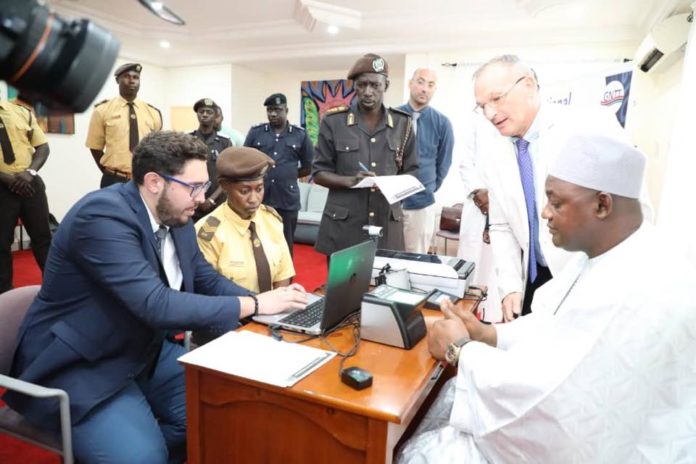By MUHAMMED S. BAH
The contract for making the new cards which has been awarded to Semlex Company, will cost four hundred and fifty dalasi to possess.
This news is contained in a press release issued by the Office of the President on Saturday 22 September 2018.
According to the release, the Minister of the Interior, Mr. Ebrima Mballow, by 1 October, the issuing of ID cards to citizens will commence but will be centralized in Banjul. It will then spread across the entire country by December.
“It is the first step in the new dispensation in The Gambia’’, said the Semlex Country Project Director, Didier Cornil. He explained that the IDs are a big advantage for citizens because it is ECOWAS standard ID; and like the ECOWAS biometric passport, the quality of the document is high standard and acceptable in most ECOWAS countries.
He also added that the new ID product has improved security features, including a chip that stores all the biometrics. It is 100% biometric that scans all the ten fingerprints.
Explaining the registration procedure, the Director General of The Gambia Immigration Department, Mr. Buba A. Sagnia, said each applicant must either produce an old ID document, birth certificate, voters’ card, or a copy of a passport as proof of Gambian citizenship.
“We complement those [methods] with vigorous interrogation to establish whether the applicant is Gambian or not. In case of lost documents, one has to produce an affidavit of support and a Police report, or attestations from Alkalo and Seyfo. ID cards are security for our citizens, so we can identify our citizens from non-citizens,” he added.
At a ceremony at state house on Friday morning where both the President and Vice President were issued with national ID cards, the Vice President remarked: “We must jealously guard our national ID cards. We should not allow foreigners to have access to our national document. Let us welcome non-citizens, accommodate them and provide them with all facilities but we should never allow anyone who is not a Gambian to be in possession of our national documents.”
“The ID card is for Gambians. We want to make that very clear for everybody living in this country. We have rules and regulations that people have to follow. We want everyone to follow the due process to get every Gambian registered,” President Barrow told the State House Press Corps.
Citizens have generally raised concerns on the fee attached to the acquisition of this important National document, saying it’s very expensive.
The new cost of the ID card which is more than double its previous cost, is beyond the reach of the average Gambian income earner.
Abdoulie Corr from the North Bank region, believes that the price is too expensive for ordinary Gambians especially people in rural communities.
“It’s expensive and will be a burden on poor Gambians especially our rural people,” he said. He added that if such document cannot be easily affordable to the people, then the freedom of movement of the ordinary citizen will be threatened. He opined that Government should cut certain expenses and subsidize the ID cards, for every Gambian to get it. He also believes that with this fee, Government is doing business on the citizens.
Alhassana Gassama, a resident of Sukuta, West Coast Region, also believes that the cost of the new National Identity Documents are far beyond the reach of the average Gambian, and queried the pegging of the cost at D450?
Similar remarks were made by Kaddy Sanyang, Mbassey Manneh, Jainaba Ceesay, and Awa Jeng, all concerned females who welcomed the development, but decried the expensive cost attached to it.
Foroyaa tried to contact the Interior Minister to communicate the numerous concerns received by the medium regarding the cost of the new national ID, to no avail.
The Spokesperson of the Gambia Immigration Department, Superintendent Mamanding S. Dibba, said as far as his department is concerned, he has no official information concerning the new ID cards, and promises to give any information on the issue if available.
The Gambian National Identity document has been an issue for a very long time now. The issue has been debated in the country’s National Assembly, in numerous sessions, and it’s availability to the public, is a welcome development, except for cost attached to it.



















